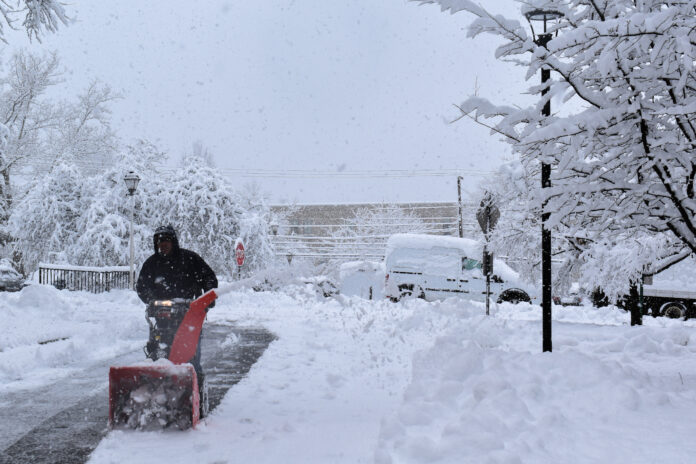
With Muhlenberg calling a campus-wide snow day this past Tuesday, and the potential for more snow and ice in the upcoming weeks, concerns are being raised about the safety of commuter students in events of inclement weather.
The College has comprehensive guidelines in the case of weather-related emergencies. This includes their Inclement Weather Policy, and their Snow and Ice Management Policy. Though the phrase “campus community” is mentioned multiple times throughout the two documents, there is no language that specifically considers commuter students.
With rates of students who commute lying just above the five percent mark, they make up the minority of students on campus, as the other roughly 95 percent live in Muhlenberg-owned housing. Further, Muhlenberg’s campus is small, and all students who live on campus easily have access without having to drive.
When asked if she believes that the administration accurately takes commuter students’ needs into consideration in cases of inclement weather, Khadijah Chaudry ‘26 expressed her thoughts. “I don’t think that the administration accurately accounts for commuter students attending classes when it comes to inclement weather. From experience, it has been a bit more difficult this year with the amount of snow we’ve been getting and where school hasn’t been canceled for any days except for this past Tuesday. While there are definitely commuters who live nearby and don’t have to face a lot of problems getting to school when the weather and roads are in poor condition, I think the administration should take into consideration commuters and faculty members who live farther away,” said Chaudry.
Muhlenberg’s commuting policy allows for all students who live in a 30-mile radius of the College to be eligible to commute. This 30-mile radius spans well into New Jersey, and out west to Albright College. It could take up to an hour to drive 30 miles, leaving commuter students having to decide if they feel safe driving long distances, on roads where they might be unsure of their safety.
Taking a look back at Jan. 16, the first day of classes this semester, there was a significant amount of snow on the ground. The College decided to open as usual, giving individual faculty members the domain to determine if they were going to hold their classes remotely.
Anam Ali ‘25 took a look back on that day. “On the first day of classes this semester, there was a significant amount of snow and ice on the ground. Though I’m not far from campus, all of my commute is through inside roads (no highways) and many streets weren’t plowed by the time I needed to get to my 9 a.m. lab. My car skid on numerous occasions on the way to campus. The worst part [was that] everything in the lab easily could have been done remotely or at a later time and I only spent one and a half hours on campus (when the lab is scheduled to be three hours). I had a commute that was risky in the morning for just one and a half hours of being on campus, which was quite frustrating.”
Vivian Jaber ‘24 also reflected back to the first day of classes when asked if the administration properly takes into consideration the needs of commuter students. “I want to say no, but I also see it from their perspectives. Commuters make [up] such a small percentage of students on campus, so canceling classes for 95 percent of students, if not more, is not ideal. Frankly, I think this is more of a faculty issue than administration. For example, we had snow on the first day of the semester and the college decided to remain open, however, some faculty either canceled their classes or moved them online. The issue is that faculty are not aware that some of their students are commuters unless they’re told. So it really becomes a situation that needs to be addressed with faculty rather than administration.”
Jesse Allan ‘25 brings up a potential disconnect between many faculty members and students, who are often both expected to commute to campus in inclement weather. “Thankfully, most professors at Muhlenberg are accommodating and understanding. However, ones that live close to the College feel like they must hold classes regardless of the fact that there’s inches of snow on the road.”
The arguable overlooking of commuter students when determining the status of snow days filters into a larger issue that came up in student discussions of the inclement weather policies– if the administration pays proper attention, and gives necessary support to commuter students and their needs.
Tim Black, director of student transitions and family programs, as well as the advisor to Jaber, the inaugural commuter advisor, discussed steps that have been taken to meet the needs of commuter students. “While Muhlenberg is always working to identify opportunities to engage the entire campus community, last year, the entire commuter population specifically was surveyed to ascertain things such as their ability to find parking, get involved on campus, and have a space to call their own on campus. The idea to survey the population came from Jaber. We worked collaboratively to identify which questions got at the heart of what we were looking for, while also providing enough space and a platform for students to identify other needs and wants they may have. This provided us with great data which has allowed us to improve our approach to commuter needs.”
Jaber, the chair of the SGA ad hoc committee for commuter students, and leader of the project to establish the new Commuter Student Lounge in Taylor Hall, gave her insight after months of working closely with faculty and administration in attempts to address the issue of administration support and concern. “Yes and no. I think the administration undermines the presence of commuters and focuses more heavily on residents because the population of students residing on campus is extremely greater than commuters. However, when I presented my project to them and highlighted all the issues that need fixing, they did not hesitate to work with and help me. They were passionate about it, and really excited to give more attention to the needs of commuters. Huge shoutout to Tim Black! With that said, it’s not ideal that the changes made only happened because a student, me, decided to survey commuters and bring the issues to admin. It’s really an issue of majority versus minority, and considering what benefits and plans will work best for the greater group.”
With commuter students gaining more visibility on campus through projects including the new lounge, commuter student surveys and the commuter student ad-hoc, it seems that student-driven initiatives with support from staff are making a huge difference to the engagement of commuter needs.
Amy Swartz ‘26 is an English & creative writing and political science double major. She is a General Editorial Assistant, and is thrilled to be a part of such an amazing organization! Outside of the Weekly, you can always find her reading a new book, updating her Spotify playlists, or rewatching an episode of New Girl!






















